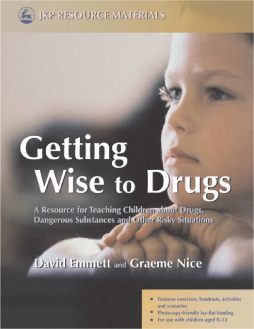
Additional Information
Book Details
Abstract
Getting Wise to Drugs is a resource for use with children aged between eight and twelve years. It comprises exercises centred on illegal drug use, medicine use and safety, solvents, alcohol, tobacco, crime and other anti-social and risky activities.
Fully photocopiable, it features a comprehensive introduction to the programme, followed by 20 exercises grouped into blocks of five, one for each year within the age range of the book. Each exercise is intended to last 30--45 minutes, and can be used in a classroom or other group situation. Each block of five exercises covers the following topics: knowledge and information, risk assessment, consequences, and handling situations.
Getting Wise to Drugs is an ideal complement to the authors' previous bestselling titles for older children and young people, Understanding Drug Issues, Second Edition and Understanding Street Drugs, Second Edition (both Jessica Kingsley Publishers).
With a wealth of materials ready for photocopying, this includes five exercises each suitable for age groups from eight to nine up to age 11 and 12. All are suitable for the full classroom but are also useful as small group knowledge and understanding of general safety-related issues, individual and group knowledge and understanding of substance abuse and other risky behaviors, choices to make when encountering dangers, and sensitivity and judgment to use when encountering a potentially dangerous incident, everyday warning signs, getting others involved intervention and prevention, temptations and pressures to conform to risky behaviors, and lessons specific to drug and alcohol abuse.
Book News
David Emmett, PhD retired from a 30-year career as a police officer in 1996, and has over 25 years' experience in the field of substance abuse, working directly with drug and alcohol abusers. He has given advice to schools and colleges as well as being involved in training for teachers, health workers, police officers and other professionals. He is a frequent guest lecturer in PhD psychology departments in UK universities. Graeme Nice has worked in the fields of counselling, drug/alcohol misuse and blood-borne diseases for over 20 years. He is Deputy Team Coordinator of an NHS substance misuse team in Hampshire, where he holds a caseload of drug clients. He has qualifications in counselling, health education and teaching.
A good tool for the youth worker
Youth Work
A helper in the treatment of children between ages 8 and 12 on the misuse of illegal drugs, alcohol, cigarettes and anti-social activities.
Pediatric Endocrinology Reviews
Table of Contents
| Section Title | Page | Action | Price |
|---|---|---|---|
| Part 1: Introduction | |||
| Chapter 1: trends influencing gender equality and women’s economic empowerment practice | |||
| Chapter 2: concepts and terms | |||
| Part 2: Key approaches for women’s economic empowerment | |||
| Chapter 3: regulatory and socio-cultural enabling environments | |||
| Chapter 4: sector development—focus on agriculture | |||
| Chapter five: financial inclusion—challenges and opportunities | |||
| Chapter 6: gender lens investing for business growth and impact | |||
| Chapter 7: enterprise development—starting and building businesses | |||
| Chapter 8: labour force participation—a pathway to greater equality | |||
| Chapter 9: information and communication technology for WEE | |||
| Part 3: Managing risk and assessing outcomes | |||
| Chapter 10: managing risks for women’s participation | |||
| Chapter 11: measuring women’s economic empowerment | |||
| Part 4: In conclusion | |||
| Chapter 12: emerging trends in innovative finance and technology innovation |
